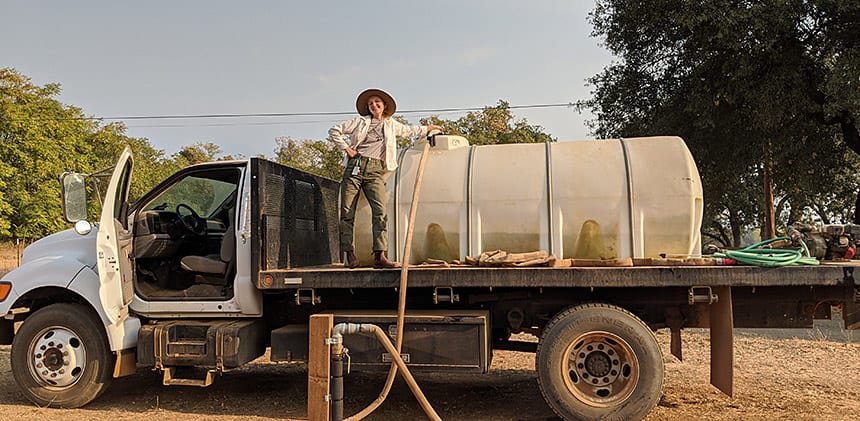
California’s increasingly severe climate impacts sparked another pioneering initiative from Berkeley Law’s top-ranked environmental law program, with the timely launch of GrizzlyCorps.
Developed by Project Climate, which operates within the school’s Center for Law, Energy & the Environment, GrizzlyCorps sends recent college graduates to work in farm and forest communities across California. Every year, 20 selected fellows will engage in 11-month placements that build forest, fire, and overall community resilience in response to climate change.
Coordinated in partnership with AmeriCorps, GrizzlyCorps facilitates projects that include promoting regenerative agriculture, forest and fire protections, and carbon sequestration. The inaugural cohort began their placements in September, and after this pilot year the program hopes to expand its scope and reach statewide.
“GrizzlyCorps brings together many elements of key importance,” says Director Ken Alex, who also leads Project Climate. “These include action on climate change, community resilience and outreach, service in underserved communities, focus on rural California, promotion of forest and farm issues, and opportunities for recent grads.”
Contributions from the Central Valley Community Foundation, Pacific Gas & Electronic Co., and the Erin Ziegler Fund, and a planning grant through California Volunteers (directed by Berkeley Law graduate Josh Fryday ’09), helped bring GrizzlyCorps to fruition.
California’s forest communities face enormous and growing fire and climate threats, which also threaten watershed and soil health. Alex notes that in farm com-munities, climate change affects the state’s water supply, crop yields, and cattle health.
GrizzlyCorps fellows receive training, field experience with direct supervision, a monthly stipend, $10,000 towards further education upon completing the full placement, and opportunities to develop professional contacts and mentors.
Fellows work in conjunction with agricultural community entities and resource conservation districts to broaden the use of regenerative techniques. In forest communities, they coordinate with local, state, and federal agencies, forest and industry groups, and NGOs to expand ways to reduce fire risk and enhance watershed and soil conditions.
“GrizzlyCorps piqued my interest because I wanted to work with environmental nonprofits and programs,” says fellow Jenna Waite, now helping The McConnell Foundation in Redding on projects involving sustainable agriculture and research, rehabilitating hundreds of acres of rangeland overtaken by weeds, and community outreach. “I couldn’t let this opportunity go.”
Fellow 2020 UC Berkeley graduate Rose Joseph is working with the Tehama County Resource Conservation District. Her projects include replanting fish habitats along the Sacramento River, creating defensible space around the homes of vulnerable populations to reduce the potential for wildfire damage, and establishing carbon farm plans.
“I wanted to do more to address the significant challenges in how my home state manages its land and food systems, especially in the context of a changing climate,” Joseph says. “I’m beyond excited for this year of service.”
— Andrew Cohen